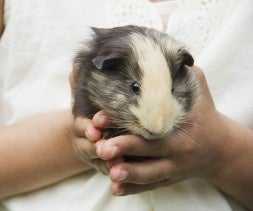Companionship for Guinea Pigs

Cavies are extremely social, herd animals who thrive in the company of other pigs. Some people who re-home believe so strongly that a companion is vital to the well-being of a lone animal that they will only place cavies as same-sex/neutered pairs or as companions to other cavies in single or multiple cavy homes. Cavies in groups are more vocal and more interesting to observe. The best entertainment for your guinea pig is a friend.
It is a common misconception that two male guinea pigs will fight. Compatibility between two guinea pigs is determined by the personalities of the individuals rather than their gender. Some cavies will fight with any pig, but the vast majority delight in having a companion. The easiest match is usually between two babies or a baby and an adult guinea pig, but adults can be paired successfully as well. Remember to quarantine any new cavies for two to three weeks in order to avoid introducing illness or parasites to your resident pig(s). This is especially important with pet-store pigs, as inexperienced staff often do not recognize signs of illness and fail to disinfect cages between shipments. If one pig is ill, chances are high the others may also be ill. If possible, adopt from a shelter or rescue group rather than buy from a pet store.
Good food A sound diet is the cornerstone of good health. Guinea pigs, like humans, require a source of vitamin C in their diet. Fresh clean water, soft grass hay, and plain dye-free pellets formulated with Vitamin C especially for guinea pigs should always be available. Small amounts of fresh vegetables (about a cup a day) are an important additional source of vitamin C and other nutrients. Parsley, romaine lettuce, a small piece of carrot, tomato and green pepper are popular choices as are forages like clean grass, clover and dandelion greens. Remember that cavies are strict herbivores and should not be fed dairy or meat products.
Unlimited high-quality grass hay, like timothy or orchard grass, is a mainstay of a cavy's diet and should always be available. Grass hay keeps the cavy's digestive system moving and helps prevent the teeth from becoming too long. Loïc Legendre, D.V.M., a specialist in veterinary dentistry in Canada feels that alfalfa pellets are too soft and high in calories and are best minimized or eliminated. He suggests providing a more natural diet of rough grass and hay, similar to what they would consume in the wild. He notes that not only their incisors but also their cheek teeth continue to grow throughout their lives, and since more concentrated food sources result in less chewing, the teeth may not wear normally, leading to malocclusion. A healthy guinea pig does not require routine tooth trimming.
Appropriate Housing Adequate space has a profound influence on the happiness and well-being of guinea pigs. Cavies introduced to large cages reportedly show their approval by "popcorning" (a term for bucking and/or throwing themselves into the air when they're happy). And more space in multiple-pig households means that getting along is easier. Teresa Murphy of Cavy Spirit Rescue in San Mateo, California, whose educational websites offer valuable advice, makes a compelling case for providing spacious cages of eight square feet and more: a larger cage will require less frequent cleaning and can be a more stimulating environment with space for play, toys and exercise. If separation from other household pets is not an issue, an open-topped enclosure allows easier interaction between you and your pet. (Also see "Resources" for attractive, affordable housing plans and designs.) Bedding materials like paper products, wood shavings or pellets should be changed every three or four days and spot-cleaned daily. Avoid cedar shavings; cedar is not recommended for any small animal.
Lyn Zantow maintains an informational cavy care website and active message board at www.guinealynx.info. She lives in Charlottesville, Virginia, with her two guinea pigs, Nina and Snowflake.
Reprinted from ASPCA Animal Watch, Spring 2004 Vol. 24, No. 1, with permission from The American Society for the Prevention of Cruelty to Animals, 424 East 92nd Street, New York, NY 10128-6804